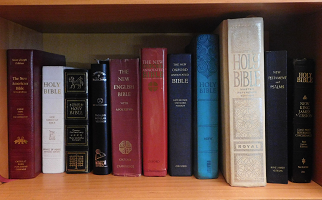The Bibles on my shelf are a combination of the ones owned by my husband, who was raised in the Lutheran faith and myself.
This is not my attempt to influence your decision on which is the better translation to use.
Picking the correct Bible to use can be a daunting task due to all the different translations out there.
The United States Conference of Catholic Bishops
have a web page to inform us Catholics which translations have been approved for use by the USCCB since 1983. If you are
not Catholic, the translation you chose should be inline with what your place of worship uses.
There are word-for-word, thought-for-thought, and paraphrase translations to choose from along with the grade level that
they are written at. An interesting fact is that most of the
English Bible translations are written at the eighth-grade level or below.
The Catholic Bible
The Catholic Bible has seven additional books in the Old Testament when it is compared to a Protestant Bibles.
The additional books in the Catholic Bible are known as Deutero-Canonicals and are mistakengly called the Apocrypha
by the Protestants. They are Tobit, Judith, 1 Maccabees, 2 Maccabees, Wisdom, Sirach (Ecclesiasticus), and Baruch.
The Catholic Bible also incudes additions to the books of Esther and Daniel.
The first Bible on the left is a New American Bible (NAB) and it is in the middle of the spectrum between the two
translation approaches. Sometimes it is more literal and at other times it is more conversational. It is written
at the seventh grade level.
I will be showing the differences between the different translations by showing the same passage for each bible.
16 Consequently, from now on we regard no one according to the flesh; even if we once knew Christ according
to the flesh, yet now we know him so no longer. 17 So whoever is in Christ is a new creation: the old things
have passed away: behold, new things have come. 18 And all this is from God, who has reconciled us to himself
through Christ and given us the ministry of reconciliation,
— 2 Corinthians 5:16-18 (St. Joseph Edition)
The Douay-Rheims Bible
The Douay-Rheims is a translation of the Latin Vulgate (Biblia Sacra Vulgata) Clementine Version which was
translated from Greek and other languages into Latin by Saint Jerome, about 382 A.D. The Latin Vulgate Bible
was declared by the Catholic Church to be the only authentic and official version, in 1546. Bishop Richard
Challoner in 1749-1752 AD took the Latin Vulgate and translated it into English. It is written at the 13th
grade level.
16 So that henceforth we know no one according to the flesh. And even though we have known Christ according
to the flesh, yet now we know him so no longer.
17 If then any man is in Christ, he is a new creature: the former things have passed away; behold, they are
made new!
18 But all things are from God, who has reconciled us to himself through Christ, and has given to us the
ministry of reconciliation.
— 2 Corinthians 5:16-18
The Bible in Tagolog
16 Kaya ngayon, ang pagtingin namin sa bawat tao ay hindi na batay sa sukatan ng tao. Noong una’y ganoon
ang aming pagkakilala kay Cristo, ngunit ngayo’y hini na. 17 Kaya’t kung nakipag-isa na kay Cristo ang
isang tao, isa na siyang bagong nilalang. Wala na ang dati niyang pagkatao, sa halip, ito’y napalitan na
ng bago. 18 Ang Diyos ang gumawa ng lahat ng ito. Sa pamamagitan ni Cristo, ibinilang niya kaming mga
kaibigan at hindi na kaaway, at pinagkatiwalaan niya kami upang maglingkod nang sa gayon ang mga tao ay
maging kaibigan rin niya.
— 2 Corinthians 5:16-18
New Revised Standard Version
16 From now on, therefore, we regard no one from a human point of view; even though we once knew
Christ from a human point of view, we know him no longer in that way. 17 So if anyone is in Christ,
there is a new creation: everything old has passed away; see, everything has become new! 18 All this
is from God, who reconciled us to himself through Christ, and has given us the ministry of reconciliation;
— 2 Corinthians 5:16-18
New International Version
16 So from now on we regard no one from a worldly point of view. Though we once regarded Christ in
this way, we do so no longer. 17 Therefore, if anyone is in Christ, the new creation has come: The
old has gone, the new is here! 18 All this is from God, who reconciled us to himself through Christ
and gave us the ministry of reconciliation:
— 2 Corinthians 5:16-18
King James Version
This is viewed as a classic and the most poetic. It was first published in 1611.
16 Wherefore henceforth know we no man after the flesh: yea, though we have known Christ after the
flesh, yet now henceforth know we him no more.
17 Therefore if any man be in Christ, he is a new creature: old things are passed away; behold, all
things are become new.
18 And all things are of God, “who hath reconciled us to himself by Jesus Christ, and hath given to
us the ministry of reconciliation;
— 2 Corinthians 5:16-18
New King James Version
16 Therefore, from now on, we regard no one according to the flesh. Even though we have known Christ
according to the flesh, yet now we know Him thus no longer.
17 Therefore, if anyone is in Christ, he is a new creation; old things have passed away; behold all
things have become new.
18 Now all things are of God, who had reconciled us to Himself through Jesus Christ, and has given
us the ministry of reconciliation,
— 2 Corinthians 5:16-18

